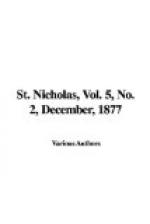Armed with the courage and energy which despair alone can give, the Venetians rallied for the defence of their city. Women and children joined in the preparations. All private feuds, jealousies and animosities were forgotten in the common danger. All were animated by the one feeling of implacable hatred of the Genoese. Pisani, an old commander, who had been unjustly imprisoned through the envy of his fellow-citizens, was released and put in command of the fleet. On coming out of his cell, he was surrounded by those who had injured him, who implored him to forget the injustice with which he had been treated. He partook of the sacrament with them in token of complete forgetfulness and forgiveness, and then proceeded against the enemy. The confidence of the republic had not been misplaced. His bravery, skill and foresight, together with the aid of another brave captain, Carl Zeno, saved the city, retook Chiozza, and completely humiliated the Genoese, who were now willing to sue for peace. So that, after all, Doria’s angry menace was the means of saving the independence of the city, and the proud possession of the bronze horses of St. Mark’s.
CHRISTMAS CARD.
(SEE “LETTER-BOX.”)
[Illustration: A greeting by my page I send To thee on Christmas Day, my friend.]
THE PETERKINS’ CHARADES.
BY LUCRETIA P. HALE.
Ever since they had come home from the great Centennial at Philadelphia, the Peterkins had felt anxious to have “something.” The little boys wanted to get up a “great Exposition,” to show to the people of the place who had not been able to go to Philadelphia. But Mr. Peterkin thought it too great an effort, and it was given up.
There was, however, a new water-trough needed on the town-common, and the ladies of the place thought it ought to be something handsome,—something more than a common trough,—and they ought to work for it.
Elizabeth Eliza had heard at Philadelphia how much women had done, and she felt they ought to contribute to such a cause. She had an idea, but she would not speak of it at first, not until after she had written to the lady from Philadelphia. She had often thought, in many cases, if they had asked her advice first, they might have saved trouble.
Still, how could they ask advice before they themselves knew what they wanted? It was very easy to ask advice, but you must first know what to ask about. And again: Elizabeth Eliza felt you might have ideas, but you could not always put them together. There was this idea of the water-trough, and then this idea of getting some money for it. So she began with writing to the lady from Philadelphia. The little boys believed she spent enough for it in postage-stamps before it all came out.




